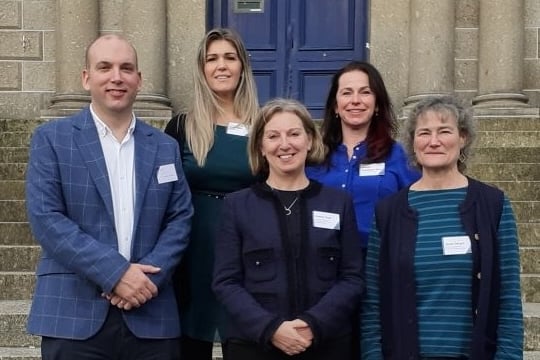CORNWALL is ideally positioned to play a leading role in the UK’s Industrial Strategy according to some of the key members of the business community.
That was the clear message at an event in Penzance entitled ‘‘UK Industrial Strategy and rural economies: The Cornish opportunity’, which was organised jointly by Cornwall Council and the National Innovation Centre for Rural Enterprise (NICRE).
The event, held at St John’s Hall, saw business leaders, national policy makers and politicians meet with a focus on ways in which rural economies such as Cornwall can help deliver the industrial strategy.
Alongside presentations from local businesses and panel discussions, working groups were organised during the event to put together some suggestions for government to respond to key barriers faced by rural businesses and take into account their uniqueness.
With attendance of representatives from the Department for Business and Trade and the Department for Environment, Food and Rural Affairs, work with government will continue after this event to make sure that the finalised UK Industrial Strategy captures the potential lying in the Cornish rural economy.
The day was hosted by professor Emma Hunt, the vice chancellor of Falmouth University, and vice chairman of the Cornwall and Isles of Scilly Economic Forum.
She said: “I couldn't be more certain about Cornwall's opportunities for the national economy. We have resources that relate to renewable energy, critical minerals, marine, the creative and cultural sectors, the agri-food sectors, and all of these are not only aligned with the national Industrial strategy but are in some cases at the very forefront.
“We want to play our part, and we want Cornwall to be recognised as somewhere that delivers, not just for ourselves but for the whole of the UK economy.”
Councillor Louis Gardner, Cornwall Council’s portfolio holder for the economy, said: “Cornwall is fantastically placed to play a leading role nationally, and bringing together key players at events like these will help us emphasise that message to Westminster.”
Professor Janet Dwyer, co-director at NICRE, said the event highlighted how Westminster needs to change its focus from just urban areas and to realise the potential places like Cornwall possess.
She said: “At NICRE we have been very clear that we see a difference in the way that business works in rural areas compared to how it works in urban areas.
“Too much policy to date really focuses on growth and innovation in an urban context so we really need to get those policy makers to understand these differences and in that sense Cornwall is a fantastic place to come to as it has some of the best examples of why rural is different and why rural is positive for the future.”
After opening remarks on the UK Industrial Strategy from the Cities and Local Growth Unit, a joint unit between the Department of Business and Trade and the Ministry of Housing, Communities and Local Government, the day included NICRE presenting evidence from its State of Rural Enterprise Surveys and research and Cornwall businesses directly sharing their experiences.
Business leaders at the event included Piran Trezise, the Chief Operating Officer at Goonhilly Earth Station, who said Cornwall was at the forefront of those able to support the UK’s economic plans.
He said: “Cornwall has a unique blend of businesses which are well placed to help the UK with its growth ambitions. This includes businesses focussed on critical minerals which are needed for net zero through to businesses in the tech sector delivering broadband and Space services such as ours at Goonhilly. Cornwall has many businesses which are well equipped to help deliver that strategy.”
Crossbench peer Lord Ewen Cameron, former chairman of the Countryside Agency, also attended the event. He said: “People have the idea that the rural economy is all about agriculture, and it is to some extent, but there is a tremendous amount of small businesses in Cornwall, and the Government needs to understand that there is a huge potential, and they should focus on it.
“Cornwall has a lot going for it, it has got energy potential in terms of wind power, it's got sunshine for solar panels, it's got mineral potential for mining including tin and lithium which has a huge world market currently dominated by the Chinese businesses and it's got small enterprising communities who, given the opportunity, could thrive - but they have to be given the opportunity and that means the delivery of power, the delivery of planning permissions. It is sitting there ready to go.”




